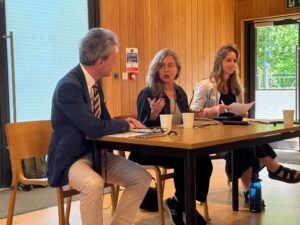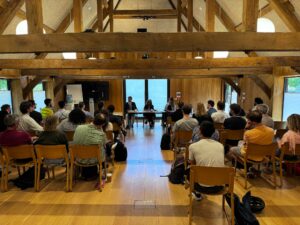On the 13th of May, a colloquium on the work and legacy of the political philosopher Hannah Arendt (1906-1975) was held at the University of Oxford. The event brought together two scholars of Arendt: Thomas Meyer, Adjunct Professor for Philosophy at the Ludwig Maximilian University of Munich, and Lyndsey Stonebridge (FBA), a Professor of Humanities and Human Rights at the University of Birmingham. Meyer and Stonebridge are the authors of two excellent recent intellectual biographies published on Arendt: Hannah Arendt: Die Biografie (Meyer 2023) and We are Free to Change the World: Hannah Arendt’s Lessons in Love and Disobedience’ (Stonebridge, 2024). This event was made possible by the generous support of the German History Society.

Taking place in Christ Church, the workshop was attended by postgraduates and academics from the History, Politics, Philosophy, Law, and Modern Languages Faculties. The discussion touched on a number of aspects of Arendt’s life, including the importance of her upbringing in Königsberg and her intellectual debt to Immanuel Kant; the enduring impact of her experience as a German-Jewish émigré on her thought; Arendt’s volunteer work for Youth Aliyah in helping Jewish refugees emigrate to Palestine; Arendt’s disregard for feminism and her relation to contemporary female thinkers, and, finally, the importance of both German and English linguistic traditions for Arendt, including Arendt’s tendency to think-in-translation across English, German, French, Latin and Greek.
Meyer and Stonebridge’s studies present two different approaches to historical biography. Whilst Meyer’s research focuses on Arendt’s years of exile in Paris (1933-1941) and reveals new archival material on her work in sending Jewish youths to Palestine, Stonebridge’s work distills the fundamental experiences of Arendt’s life and draws together the relevance of her writings on freedom, thinking, terror, love, and exile for present-day politics. Despite differences in methodology and scope, Meyer and Stonebridge’s dialogue revealed a strong shared understanding of Arendt’s thought and jointly navigated the thicket of Arendt’s controversial position in twenty first-century scholarship. Whilst Arendt is often painted as an unyielding, ‘tough-enough’ public intellectual, a different side of Arendt’s character surfaced in the discussion. For Stonebridge, Arendt was someone who was intimate with vulnerability and frailty: “what was really germane about her political thought was the fearlessness with which she embraced that sense of the frailty of the human condition… I realised an Arendt who was affirming vulnerability, affirming contingency, whose radical theory of freedom was about the relinquishment of sovereignty”. Arendt’s experience as a refugee and ‘pariah’ thinker — as someone who observes political life as an outsider was fundamental to her understanding of human rights and statelessness, of “what it means to be someone who has been wrenched out of a political community.” (Stonebridge). Meyer impressed that Arendt’s feeling of being die Fremde, the foreigner, was something that existed from the very beginning of her life, in the form of loneliness and the fear of being detected as a foreigner apparent in her early writings.
One recurring theme of the discussion was the difficulty of writing an intellectual biography about a figure whose thought is as interdisciplinary and thematically expansive as Arendt’s: “Arendt is not a linear thinker…it was incredibly difficult to find a narrative in which one could do some kind of justice to her work.” (Stonebridge). For Meyer, another difficulty arose in the archives. Whilst fact checking stories about Arendt, Meyer found that a number of the commonly-held ‘myths’ concerning the events of Arendt’s life unravelled: “[It] was not a comfortable position because I realised that most of the stories told in a very beautiful way by Elizabeth Young-Bruehl were, let’s say, a little bit different. So the family story was different, her upbringing was different.”.
The colloquium provided a rare opportunity to hear from scholars of Arendt from both Germany and England. By discussing Meyer and Stonebridge’s work side by the side, the panel and the students reflected on the paramount importance of continental thought and European history for Arendt’s thought.
Sophie West is a DPhil Candidate in Modern Intellectual History at the University of Oxford, supervised by Dr Joshua Bennett and Professor Avi Lifschitz. Her research explores Arendt’s writings on the ‘life of the mind’ and historical understanding within the context of interwar German history and philosophy.